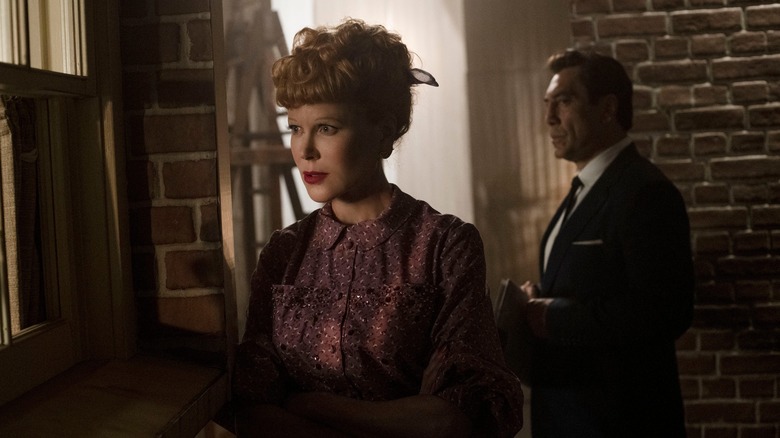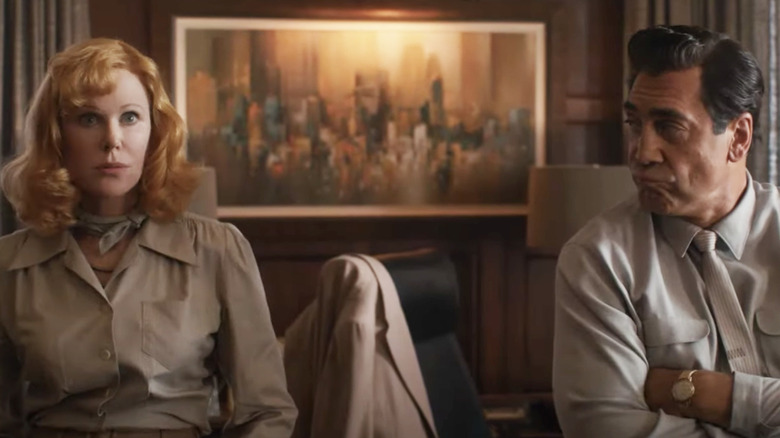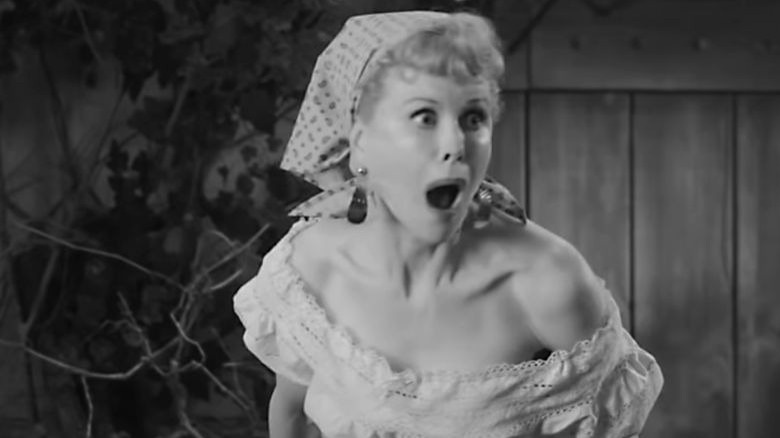Being The Ricardos Director Aaron Sorkin On Sacrificing Accuracy To Get To The Truth [Interview]
Aaron Sorkin's "Being the Ricardos" is a stunning look at two of the most revered entertainers in U.S. history, Lucille Ball (Nicole Kidman) and Desi Arnaz (Javier Bardem). Working together as the leads and driving creative force behind the classic sitcom "I Love Lucy" (alongside the pair's other endeavors) puts the couple on a delicate tightrope, both personally and professionally. Sorkin's script follows them through one week of production as a harrowing set of pressures descend on them from all sides: Lucy is accused of being a Communist, the couple experience severe relationship issues, and they also grapple with how to incorporate Lucy's pregnancy on the air in an era in which such a thing had never been done.
It's undoubtedly a challenge to focus on one of the most beloved and influential performers of all time, especially when she's locked in a web of increasingly dire crises. But Sorkin pulls it off and the resulting movie is one of the best films of this awards season, buoyed by its stunning set of performances, great script, and production design that wows. I spoke with writer/director Aaron Sorkin about "Being The Ricardos," capturing Lucille Ball and Desi Arnaz, writing tips, and more.
"What it comes down to is ... the difference between accuracy and truth"
First, I love the project — I grew up watching Lucy with my family. The movie is so interesting. Why take on this project?
Aaron Sorkin: About five years ago, Todd Black, our producer, asked to meet with me and he asked me if I want to write a movie about Lucille Ball and Desi Arnaz. It started there, and for about the next 18 months we would meet once a month, once every couple of months, and he would just sort of feed me bits of knowledge about Lucy and Desi. For instance, I didn't know that Lucy had been accused of being a Communist. I learned that in our first meeting, and I just was curious if I was the only one that who didn't know that Lucy was accused of being a Communist. I asked around and no, nobody seemed to know.
More important than that, or as important as that, I began to discover these interesting points of friction between Lucy and Desi. I also discovered that there are people — listen, you just said that you grew up watching "I Love Lucy." A lot of people did. Most of us did. But within that group, there is another large group of people who have a very intense relationship to Lucille Ball — except it's not to Lucille Ball, it's to Lucy Ricardo. It's not to Desi Arnaz, it's to Ricky Ricardo, and they have a very difficult time separating the actor from the character. They don't have a difficult time, they don't bother separating the actor from the character. That marriage is important to them.
The friendship between Lucy and Ethel is important to them, and the actors are so different than the characters that you began to think, 'I really would like to have an idea for how to tell this story, because there's stuff there that I want to write.' Then I got the idea for the structure of, 'What if it all took place in one production week of "I Love Lucy?"' Monday table read to Friday audience taping, three big events that actually took place over two years, put them in one week and really put on the pressure on our protagonists. See what happens.
Honestly, I love that technique, because I do think it really condensed and added a lot of organic drama to the different plot lines.
Aaron Sorkin: Yeah. I like claustrophobic space and claustrophobic time. I think that it's kind of like if you're holding a tangerine in your hand, and you squeeze it as hard and as fast as you can. A lot of pulp juice is going to fly, and it's kind of what I try to do with drama.
Lucy still stands out as one of the greatest comic writers and performers of all time. She absolutely influenced so many people. Did she have an influence on you or your career?
Aaron Sorkin: Well, I think that anyone who has done a half hour comedy in the last 60 years is to some extent walking in the footprints that Lucy and Desi left. So yeah, sure it has.
How different is it to write characters based on real people?
Aaron Sorkin: My first time doing it was "Charlie Wilson's War," the first time I wrote nonfiction. As good a time as I had making that movie, I just told myself that I was never going to do nonfiction again. I was never going to write about real people, and then my next six movies were nonfiction. Here's what I do. I fill up on research, I fill up on the journalism of it, and then I leave that behind, okay? I have to make them my characters. Obviously, I wouldn't defame anyone. I wouldn't pervert history in a way that's a problem, and I understand that I took three events that happened over two years and I put them in one week. I just don't consider that perverting history. I consider that a construct of a movie.
You have to rely on your own inner compass. If your inner compass is broken, the studio's legal department will be happy to help you fix it. But what it comes down to is the difference between a photograph and a painting, the difference between accuracy and truth. There are times when you're willing to, if not happy to, sacrifice accuracy to get at a more important truth. I think, for instance, in "Being the Ricardos," we sacrifice accuracy and do get at a more important, more interesting truth about those people and the times they were living in.
"What I want is for people to enjoy themselves for the two hours I've asked them to watch the movie"
What's that process like for you to wear both writer and director's hats, and what was the most difficult part of doing it here?
Aaron Sorkin: First of all, yes, I've directed the last three screenplays I've written, but I still haven't written a screenplay knowing I was going to be the director. It has always come as a surprise at the end of the process of writing it. To me, it doesn't feel like I'm taking off one hat and [putting] on another. It really feels like a continuation of writing the screenplay. Like writing music and then conducting it, or writing music and then playing it. So, I think if I have a strength as a director it's knowing what my weaknesses as a director are, and I try to put people in the top positions who are going to help me with those weaknesses. In this case, our production designer, Jon Hutman, our DP, Jeff Cronenweth, with costume designer Susan Lyall, editor Alan Baumgarten — I consider them all co-authors of the film.
What was it like building the world of their era?
Aaron Sorkin: It was fun. I mean, what you're asking is a question better asked to our production designer Jon Hutman. He was the production designer for "The West Wing." He designed "The West Wing," but the reason I wanted him on "Being the Ricardos" was he was the production designer on "Quiz Show" and I really loved that look and feel, and wanted him to do the Hollywood version of what he did with New York in 1950s. 'So it was like that,' I would say that to Jon, and he would start to show me pictures, wanting to tell me what he liked, wanting to know what I liked, though I generally would just follow his nose and like what he likes.
How did you end up casting Nicole and Javier?
Aaron Sorkin: Remember that — I wasn't casting Lucy Ricardo and Ricky Ricardo. Right? I was casting Lucille Ball and Desi Arnaz, and moreover, I was not casting them in a vacuum. I was casting the Lucille Ball and Desi Arnaz that are in this script, the characters in this script. So for Lucy, I needed a world-class dramatic actress with a dry sense of humor, and agility with language. For Javier, again, a world-class actor, and in Javier's case he is so charming, so charismatic, so gregarious, so impossible not to love, that ... all these meetings were by Zoom, and a minute into my Zoom with Javier I just knew that's what I had to have, because he's going to break our heart at the end of the movie, and we have to be sad and not mad.
Is there anything in particular about the meaning of the film that you would love the audience to take home?
Aaron Sorkin: What I want is for people to enjoy themselves for the two hours I've asked them to watch the movie. A couple of things maybe to toss around, for instance: Lucy is in deep trouble, literally about to be canceled. The show as well as her career, Desi's career, and it's because of something she checked the box for 16 years ago at a time, as she says in the film, it wasn't considered much worse than being a Republican. It's a different time. Russia was our ally. This has been dug up, and she's about to be killed for it today. If that reminds anybody of our culture today, that's okay with me.
Congrats on "The Social Network" hitting so highly appropriately on the new WGA list of the top screenplays. Fantastic movie. I love it a bunch.
Aaron Sorkin: Thank you very much.
Absolutely. If you were to give one piece of screenwriting advice that's dear to your heart, what would it be?
Aaron Sorkin: It would be this: Intention and obstacle. You need an intention and obstacle to have drama. Somebody wants something, something standing in their way of getting it. You have to start with that. That's the driveshaft of drama.
"Being the Ricardos" is now in limited theatrical release and streaming on Amazon Prime Video.


